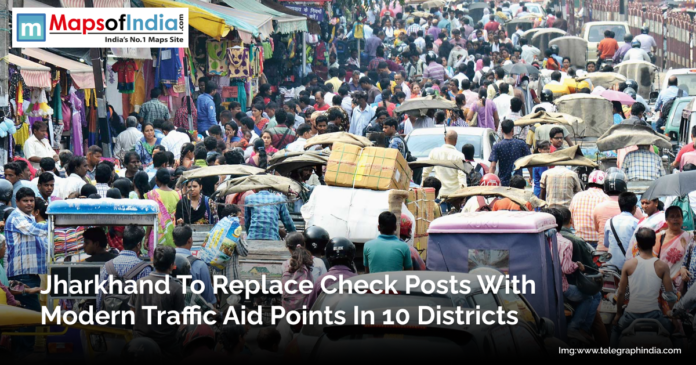With this Jharkhand Transport Department has presented a game-changer plan to modernize the road governance and recover lost revenues, wiping out traditional check posts by installing the state-of-the-art Traffic Aid Points (TAPs) in ten districts across Jharkhand. Led by direction issued by the Chief Minister, this strategic attempt will help to increase digital productivity in vehicle monitoring, facilitate security needs, and manage traffic at large.
After being the major source of commercial tax collection, the check posts of the state were closed, resulting in a tremendous loss of revenues. To fill in this loophole, TAPs will be set up at notable border and entry-exit points within Hazaribagh, Latehar, Garhwa, Chatra, Deoghar, Dhanbad, Sahibganj, Saraikela, Giridih and Godda. Such contemporary offices will provide civic effectiveness and government accountability.
All Traffic Aid Points will have modern surveillance devices such as CCTV cameras, automatic number plate recognition (ANPR) cameras and GPS-based fleet monitoring to ensure real-time monitoring of traffic moving in and out of the state. Digital infrastructure to check vehicle documentation, raise e-challan directly and validation of paperwork on the spot without involving parties will also be hosted in the TAPs, a giant leap over the archaic manual systems of yesteryear.
The TAPs will also improve the safety of highways; these are on top of monitoring and enforcement; there will be ambulances stationed on the highway, first-aid centres and emergency calling. Electronic signboards will also be used to provide live information on traffic rules, weather conditions and the most appropriate routes to commuters, hence providing them with vital information on the road.
In addition to improving operational capacities, these Traffic Aid Points will become powerful deterrents to illegal movement of goods, especially where smuggling used to be free. The strategy of using technology and snapping it in strategic areas should help the state reduce illegal trade, but at the same time, be able to transport legal goods freely.
The authorities are now confident that the transformation of check posts to digital TAP systems will not only restore the lost revenues but also that the transport ecosystem will become more transparent and efficient. The conjoined technology, which will involve surveillance, documentation, response in times of emergencies and information to the citizens, will revolutionize the way Jharkhand controls the movement of its major thoroughfares.
With the plan implemented on the ground, local governments and communities within the targeted districts are gearing towards a change that is likely to be safe on the roads, improved compliance and service delivery. The TAP program is indicative of a progressive policy change that combines state-of-the-art digital networks with the need for critical public infrastructure to tackle the demands of the present mobility in Jharkhand- and intends to establish a new standard in state traffic management.










